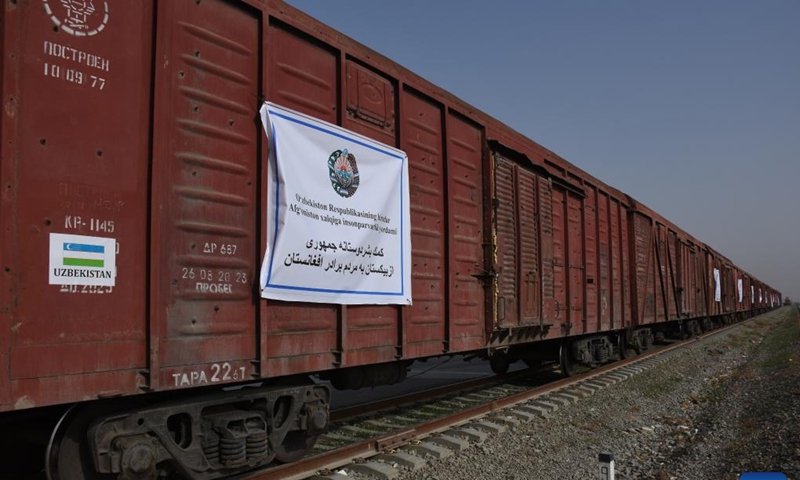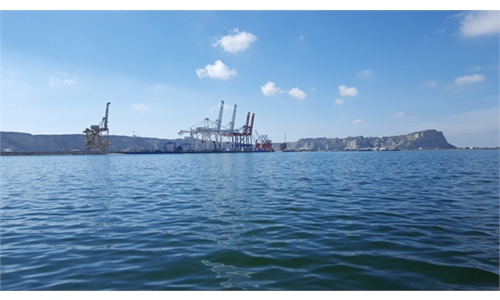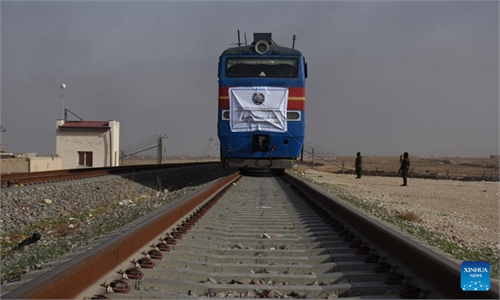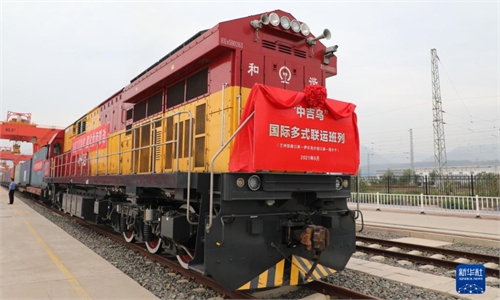
Rail wagons loaded with humanitarian aid provided by Uzbekistan arrive in Mazar-i-Sharif, Afghanistan on Dec. 23, 2021. Uzbekistan has provided 3,700 tons of humanitarian aid to war-torn Afghanistan to help needy people in the chilly winter.(Photo: Xinhua)
The China-Kyrgyzstan-Uzbekistan (CKU) railway may finally move to the construction stage after years of delay. A tripartite online meeting was held recently by related departments from China, Kyrgyzstan and Uzbekistan to study and promote the project, China's National Development and Reform Commission (NDRC) said on Monday. Planning for the project started in 1997.The meeting was held on Thursday, with the NDRC, China's National Railway Administration, related companies, and transport authorities from Kyrgyzstan and Uzbekistan attending the meeting, said the NDRC.
Before the meeting, leaders and officials of Kyrgyzstan and Uzbekistan reportedly disclosed that the construction of the long-awaited transnational railway may start soon. The construction of the CKU railroad will begin next year, Kyrgyz President Sadyr Zhaparov told local media on May 30.
"We will start next year after the feasibility study is completed this year. The feasibility study is being prepared with the participation of three parties… There will be jobs. Our economy will boom," said Zhaparov, noting that it has been 20 years since Kyrgyzstan said it wanted to build the railway.
On Monday, Ambassador of Kyrgyzstan to China Kanaiym Baktygulova said at a webinar hosted by the Renmin University of China that it is expected that construction could start soon. The railway will improve the level of connectivity of Central Asian countries and enable the region to fully tap the potential of transport and transit logistics, Chinese media 21jingji.com reported.
Under the initial plan, the total length of the line will be 523 kilometers -- 213 kilometers in China, 260 kilometers in Kyrgyzstan and 50 kilometers in Uzbekistan. The railway will be the shortest route to transport goods from China to Europe and the Middle East, cutting the journey by 900 kilometers and saving seven to eight days of travel time.
The railway will be of great significance for the three countries. It will greatly improve the transport conditions and transit capacity of Kyrgyzstan and Uzbekistan, which will further boost their economic growth, Zhu Yongbiao, a professor at the Research Center for the Belt and Road of Lanzhou University, told the Global Times on Tuesday.
In terms of regional development, the railway will enhance connectivity between China and Central Asian countries, as well as among regional nations under the Belt and Road Initiative (BRI), Zhu said, noting that improved trade and enhanced connectivity will help Central Asia to integrate deeply with the international market.
The railway will complete the southern passage of the New Eurasian Land Bridge, shaping a convenient transport path from East and Southeast Asia to Central and Western Asia, Northern Africa and Europe, according to reports. Growing China-Europe freight train services have been boosting trade and economic exchanges in Eurasia.
Since the establishment of diplomatic ties 30 years ago, bilateral trade between China and Kyrgyzstan has grown by nearly 180 times. China has become Kyrgyzstan's largest trading partner and source of investment, according to the Embassy of China in Kyrgyzstan.
As for financing, Ambassador Baktygulova said it was one of the key issues that had slowed down the project.
Zhu noted that China and its partners have accumulated successful experience in building infrastructure projects under the BRI in recent years.
"There are mature financing mechanisms, offering competitive service for large transnational infrastructure projects. It is believed that the involved parties could come up with a practical solution," he added.



